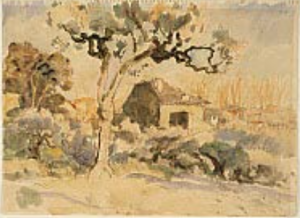This sublime landscape of Southern France illustrates a particular interest in the mundane in this time period. Poem “C” by Louis Aragon also points to a time of routine waiting, much like the rests from marching that the United States soldiers took on the French countryside during World War I. The ballad “J’attendrai” (I Will Wait) by Dalida speaks to the unsettling time spent waiting for soldiers to return from war, and some people’s desire to “seek oblivion.”
“Of a mad duke’s castle the poem tells
And of the swans in the castle moats
Of the meadow where dances every day
An everlasting fiancée
A song I have drunk like icy milk
Of glories long and falsely spun”
Poem: “C” by Louis Aragon
Lyrics in English:
I will wait night and day,
I will wait forever,
For you to come back, I will wait, [I will wait]
For the bird flying away
Comes to seek oblivion in its nest.
Time flies and runs,
Beating sadly in my oh so heavy heart
And yet I will wait for you to come back
I will wait night and day,
I will wait forever,
For you to come back, I will wait, [I will wait]
For the bird flying away
Comes to seek oblivion in its nest.
Time flies and runs,
Beating sadly in my oh so heavy heart
And yet I will wait for you to come back
The wind is bringing distant sounds,
Watching at the door, I’m listening in vain,
Alas, there is nothing for me to hear anymore.
I will wait night and day,
I will wait forever,
For you to come back, I will wait, [I will wait]
For the bird flying away
Comes to seek oblivion in its nest.
Time flies and runs,
Beating sadly in my oh so heavy heart
And yet I will wait for you to come back
And yet I will wait for you to come back
Time flies and runs,
Beating sadly in my oh so heavy heart
And yet I will wait for you to come back
Roger Elliot Fry (1866-1934), Landscape: Southern France



